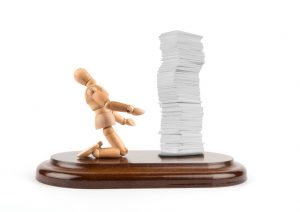In Defense Of Paper
Sure, there's plenty of technology available, but some lawyers still love paper documents.

‘The Paper Approach’ to discovery: not good.
While technology has opened the door for a whole new manner of litigating, I remain a firm supporter of all things paper. This comes from trying out different methods of processing information and always returning to the trusted original — printing out and marking up by hand the documents I am working on.
Advances in technology have done amazing things for the practice of law, and for litigators in particular. Access to caselaw and secondary sources through research databases like Westlaw or Lexis not only makes our work more efficient, but allows law firms of all shapes and sizes (not to mention pro se parties) to support their legal arguments with the same resources and compete on a more level playing field. Remote access and email allows us to balance our work and family obligations (if one has enough discipline to step away from her devices) in a way that was impossible not so long ago. The use of electronic exhibits, videos, and slideshows in court permits litigators to present their cases to juries in a streamlined and readily understood manner, in a way that paper demonstratives never could. And this is only a small selection.

Generative AI In Legal Work — What’s Fact And What’s Fiction?

But none of these developments change how an individual attorney’s mind processes information and focuses his or her arguments. For many, it is effective to review an adversary’s brief or letter on a computer or tablet screen, but for others — like me — there is something essential about holding, reviewing, and marking-up a physical copy of the document. The same goes for argument outlines and documents to be used in court.
Perhaps my inclination towards paper is because I fall somewhere in between those who grew up with a smartphone or tablet in their hands, and those who relied on landlines and printed texts. I used (and quickly came to rely upon) a cell phone and laptop in college, but can still recall submitting papers prepared on a typewriter with books from the library.
While I can’t imagine going back to the days before near constant connection, I am also, unapologetically, a paper person (indeed, several of my colleagues will be the first to comment on how I almost certainly go through more paper than most firm staff combined). This is despite the fact that my firm is particularly advanced in terms of how we use technology to better serve our clients.
While I certainly take advantage of this technology, I also know that, when processing an adversary’s arguments or preparing my own, it is essential for me to go through the physical papers with a pen and highlighter and to map out my thoughts and plan by hand. The same goes for editing my work or that of a colleague. I have learned that I simply need the tangible act to best process the information before me and to best represent the interests of my clients.
Sponsored

Generative AI In Legal Work — What’s Fact And What’s Fiction?


Is The Future Of Law Distributed? Lessons From The Tech Adoption Curve

Navigating Financial Success by Avoiding Common Pitfalls and Maximizing Firm Performance

Is The Future Of Law Distributed? Lessons From The Tech Adoption Curve
Now, this is definitely not the right thing for everyone. I often see one of my colleagues preparing for an argument entirely on a tablet, through which he has access to the entire case file, emails, and documents alike. This allows him to be incredibly efficient and mobile, while achieving excellent results for his clients. But I know that this simply does not work for me.
Technology and the demands of one’s job may change what this means as time proceeds, so it is also important to be ready to adapt (even I am now considering testing out using a stylus to write directly on a tablet to prepare for a longer commute). But, like most of the logistical aspects of our job, the most important consideration is to determine what works best for you and your clients, and proceed accordingly.
So, until I discover a better method, knowing myself and how I process information, I remain a staunch supporter of paper.
 Jillian L. McNeil was an attorney at Balestriere Fariello, a trial and investigations law firm which represents clients in all aspects of complex commercial litigation and arbitration from pre-filing investigations to trial and appeals. You can reach firm partner John Balestriere at john.g.balestriere@balestrierefariello.com.
Jillian L. McNeil was an attorney at Balestriere Fariello, a trial and investigations law firm which represents clients in all aspects of complex commercial litigation and arbitration from pre-filing investigations to trial and appeals. You can reach firm partner John Balestriere at john.g.balestriere@balestrierefariello.com.
Sponsored

Legal AI: 3 Steps Law Firms Should Take Now








